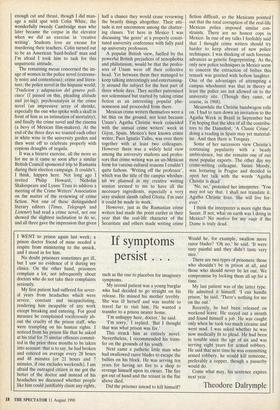If symptoms
persist . • .
I WENT to prison again last week; a prison doctor friend of mine needed a respite from ministering to the unsick, and I stood in for him.
No doubt prisoners sometimes get ill, but I saw no evidence of it during my clinics. On the other hand, prisoners complain a lot, not infrequently about doctors who do not take their complaints seriously.
My first patient had suffered for sever- al years from headaches which were severe, constant and incapacitating, rendering him incapable of any work except breaking and entering. For good measure he complained vociferously ab- out the cruelty of the prison staff, who were trampling on his human rights. I noticed from his prison file that he asked at his trial for 75 similar offences commit- ted in the prior three months to be taken into account: that is to say, he had broken and entered on average every 28 hours and 48 minutes (or 21 hours and 7 minutes, if one excludes weekends). I am afraid the outraged citizen in me got the better of the doctor and instead of his headaches we discussed whether people like him could justifiably claim any rights, such as the one to placebos for imaginary symptoms.
My second patient was a young burglar who had decided to go straight on his release. He missed his mother terribly. She was ill herself and was unable to travel far to visit him. He wanted a transfer to a prison nearer home, 'I'm unhappy here, doctor,' he said. 'I'm sorry,' I replied. 'But I thought that was what prison was for.'
This struck him as entirely novel. Nevertheless, I recommended his trans- fer on the grounds of his youth.
Next came a pathetic little man who had swallowed razor blades to escape the bullies on his block. He was serving ten years for having set fire to a shop to revenge himself upon its owner. The fire got out of hand and the tenant in the flat above died.
Did the prisoner intend to kill himself? Would he, for example, swallow more razor blades? 'Oh no,' he said. 'It were very painful and they didn't taste very nice.'
There are two types of prisoners: those who shouldn't be in prison at all, and those who should never be let out. We compromise by locking them all up for a time.
My last patient was of the latter type. He admitted it himself. 'I can handle prison,' he said. 'There's nothing for me on the out.'
Recently, he had been released on weekend leave. He stayed out a month and found himself a job. He was caught only when he took too much cocaine and went mad. I was asked whether he was now medically fit to plead. He had been in trouble since the age of six and was serving eight years for armed robbery. He said that next time he was committing armed robbery, he would kill someone, preferably a copper, though a passerby would do.
Come what may, his sentence expires next year.
Theodore Dalrymple










































 Previous page
Previous page